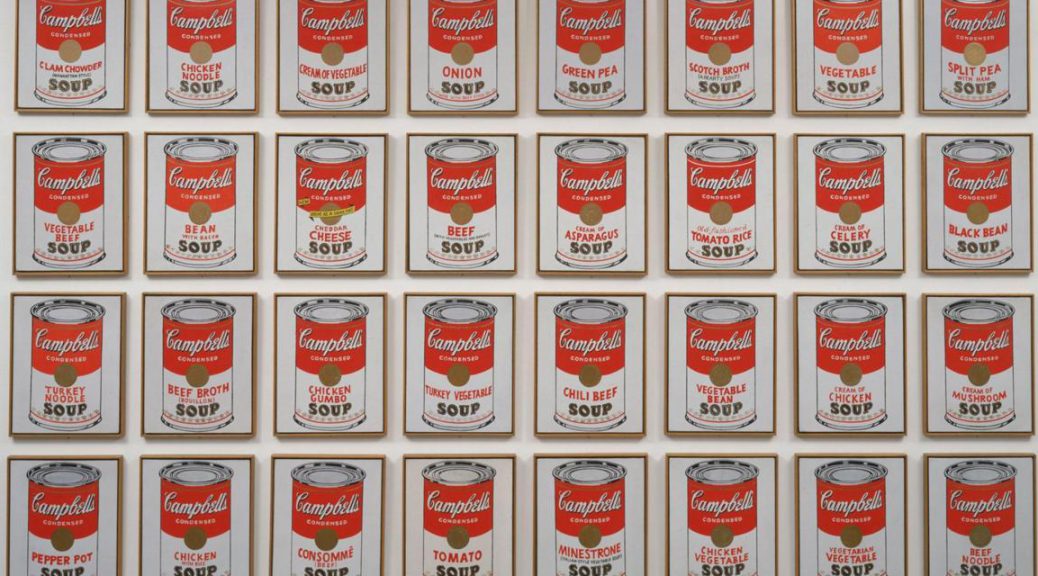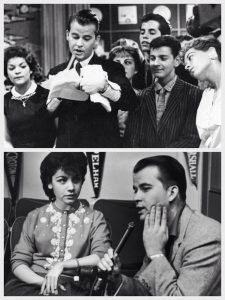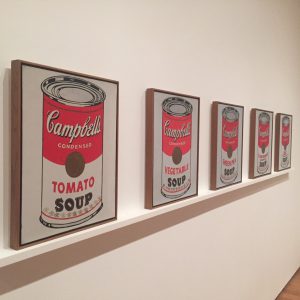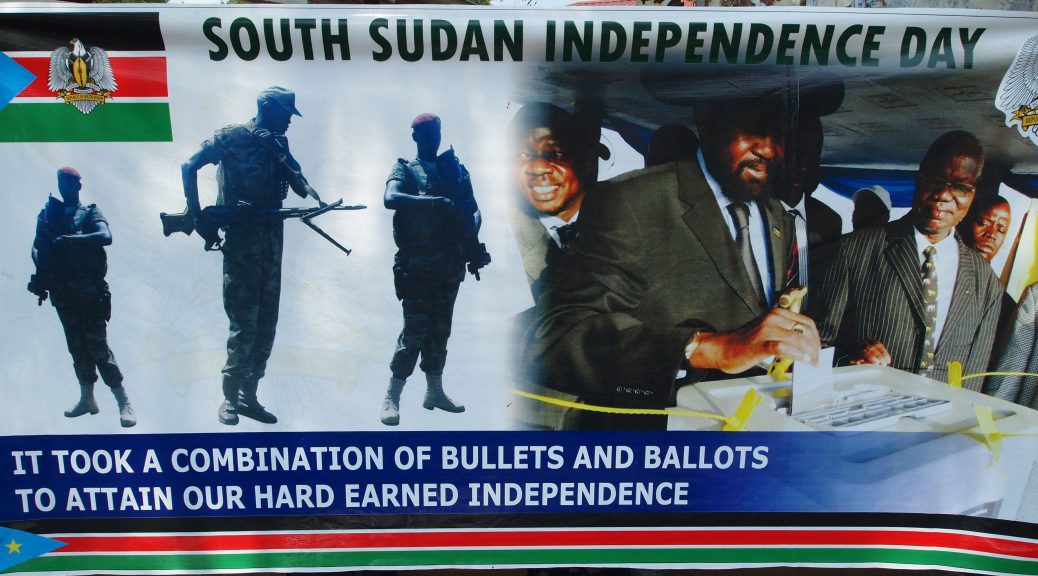July 9 Peace Love Art Activism
Feminism
Fourteenth Amendment
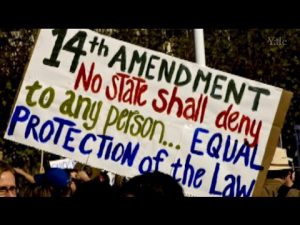
July 9, 1868: the Fourteenth Amendment to the United States Constitution ratified, explicitly protecting the voting rights of only the “male inhabitants” of the United States. This marks the first instance in which the Constitution clearly links citizenship and voting rights to gender.
The amendment extended the Fifth Amendment’s protections to the states. The Fourteenth Amendment states: “nor shall any state deprive any person of life, liberty, or property, without due process of law; nor deny to any person within its jurisdiction the equal protection of the laws.” The Fourteenth Amendment will be cited in the June 29, 1972 Supreme Court case Furman v. Georgia which ruled the death penalty unconstitutional as administered. The Fourteenth Amendment was also cited in the Mar. 1, 2005 Supreme Court case Roper v. Simmons which ruled the death penalty unconstitutional for offenders under the age of 18. (BH, see Sept 3; DP, see August 6, 1890; VR, see April 1869)
Matilda Joslyn Gage
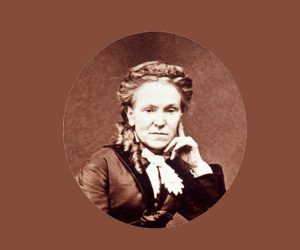
In 1869 Gage helped found New York State Woman Suffrage Association; served as president for nine years.
Matilda Joslyn Gage continued
In 1870 Gage researched and published “Woman as Inventor.” In it, Gage credited the invention of the cotton gin to a woman, Catherine Littlefield Greene. Gage claimed that Greene suggested to Whitney the use of a brush-like component instrumental in separating out the seeds and cotton. [Gage provided no source for this claim and to date there has been no independent verification of Greene’s role in the invention of the gin. However, many believe that Eli Whitney received the patent for the gin and the sole credit in history textbooks for its invention only because social norms inhibited women from registering for patents.]
Gage writes about American Indians
In the 1870s Gage wrote a series of articles speaking out against United States’ unjust treatment of American Indians and describing superior position of native women. “The division of power between the sexes in this Indian republic was nearly equal,” Gage wrote of the Iroquois. In matters of government, “…its women exercised controlling power in peace and war … no sale of lands was valid without consent” of the women, while “the family relation among the Iroquois demonstrated woman’s superiority in power … in the home, the wife was absolute … if the Iroquois husband and wife separated, the wife took with her all the property she had brought … the children also accompanied the mother, whose right to them was recognized as supreme.” “Never was justice more perfect, never civilization higher,” Gage concluded. (Feminsim, see February 3, 1870; see Gage for expanded story)
Emma Goldman
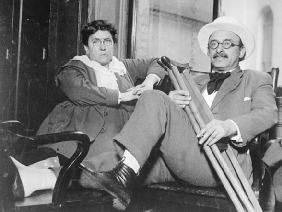
July 9, 1917: a jury found Emma Goldman and Alexander Berkman guilty of conspiracy against the selective draft law in NYC. They were fined $10,000, sentenced to two years’ imprisonment, and immediately transported to federal penitentiaries: Berkman is sent to Atlanta State Penitentiary in Georgia and Goldman is taken to Jefferson City Penitentiary in Missouri. (see Sept 11)
Florence Blanchfield
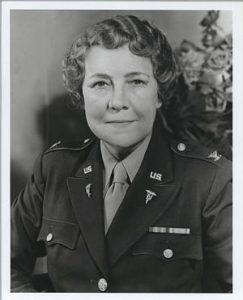
July 9, 1947: In a ceremony held at the Pentagon in Arlington, Virginia, General Dwight D. Eisenhower appointed Florence Blanchfield to be a lieutenant colonel in the U.S. Army, making her the first woman in U.S. history to hold permanent military rank. A member of the Army Nurse Corps since 1917, Blanchfield secured her commission following the passage of the Army-Navy Nurse Act of 1947 by Congress. Blanchfield had served as superintendent of the Army Nurse Corps during World War II and was instrumental in securing passage of the Army-Navy Nurse Act, which was advocated by Representative Frances Payne Bolton. In 1951, Blanchfield received the Florence Nightingale Award from the International Red Cross. In 1978, a U.S. Army hospital in Fort Campbell, Kentucky, was named in her honor. [1971 NYT obit] (see December 2, 1949)
Alice Paul dies
July 9, 1977: from the New York Times. “Alice Paul, a pioneer of the women’s movement who helped lead the fight for women’s suffrage and who, more than 50 years ago, helped draft the forerunner to today’s proposed equal rights amendment to the Constitution, died yesterday at the Quaker Greenleaf Extension Home in Moorestown, N.J. She was 92 years old.” (see April 19, 1978)
July 9 Peace Love Art Activism
BLACK HISTORY
James H Meredith
July 9, 1963: following the June 12 assassination of Medgar Evers, James Meredith had issued a statement that read in part: The blame clearly rests with the Governors of the Southern states and their defiant and provocative actions’ it rests with the blind courts and prejudiced juries; it is known by both blacks and whites that no white man will be punished for any crime against a Negro. He went on to say that nothing had happened to the guilty parties in the September 30 riots and called for “a general boycott of everything possible by all Negroes within the boundaries of the State of Mississippi.” On July 9, Governor Ross Barnett asked the Federal Court permission to expel Meredith for those statements. (see Aug 18)
Blacks cannot congregate
July 9, 1964: Dallas County (Alabama) Circuit Court Judge James Hare issued an injunction effectively forbidding gatherings of three or more people to discuss civil rights or voter registration in Selma. (see July 12)
137 SHOTS
July 9, 2015: Cuyahoga County prosecutor Tim McGinty offered to drop charges against five white police supervisors accused of failing to stop a car chase that ended in a deadly 137-shot barrage of police gunfire and the deaths of two unarmed black people if they’re willing to say they endangered the public and meet other conditions, attorneys for two supervisors said Wednesday. Both attorneys said their clients have rejected the deal and are prepared to go to trial. (see 137 for expanded story)
Stop and Frisk Policy
July 9, 2015: according to Peter Zimroth, a federal monitor appointed to oversee court-ordered changes to the department regarding stop-and-frisk, the New York Police Department may not be accurately reporting the number of stop-and-frisk encounters, casting doubt on the extent of the decline in the crime-fighting tactic.
In his first progress report since his appointment, Zimroth wrote that an NYPD audit showed that some officers were conducting street stops without documenting them correctly or weren’t documenting them at all in some cases.
He also said in the 87-page report that interviews and conversations with NYPD members of varying ranks found that some officers may not be making stops that would be lawful because they aren’t sure what they are authorized to do and they fear “legal liability” and discipline. (see July 28)
July 9 Peace Love Art Activism
Roots of Rock
July 9, 1955: “Rock Around the Clock” became the first rock and roll recording to hit the top of Billboard’s Pop charts, a feat it repeated on charts around the world. (see Aug 21)
Dick Clark
July 9, 1956: Dick Clark took over as the host of Philadelphia’s TV dance show on WFIL, called Bandstand. He got the job after the former host Bob Horn was arrested for DUI. The show would go national on ABC the following year, with the name changed to American Bandstand. (see Sept 9)
Bob Dylan
July 9, 1962: Dylan recorded “Blowin’ In the Wind” A few weeks earlier when he performed it live he stated, “This here ain’t no protest song or anything like that, ’cause I don’t write no protest songs” while onstage at Gerde’s Folk City in Greenwich Village, talking about a song he claims to have written in just 10 minutes. (see July 30)
Cultural Milestone
July 9, 1962: the first one-man exhibition for artist Andy Warhol opens at Ferus Gallery in Los Angeles, consisting of 32 silk-screened portraits of Campbell’s soup cans. (see March 5, 1963)
The Beatles
July 9 – 15, 1966: “Paperback Writer” #1 on the Billboard Hot 100. (see Paperback for more; next Beatles, see July 29)
July 9 Peace Love Art Activism
Nuclear/Chemical News
July 9, 1955: Bertrand Russell issued the Russell–Einstein Manifesto. It highlighted the dangers posed by nuclear weapons and called for world leaders to seek peaceful resolutions to international conflict. It’s Resolution read:
We invite this Congress, and through it the scientists of the world and the general public, to subscribe to the following resolution: “In view of the fact that in any future world war nuclear weapons will certainly be employed, and that such weapons threaten the continued existence of mankind, we urge the Governments of the world to realize, and to acknowledge publicly, that their purpose cannot be furthered by a world war, and we urge them, consequently, to find peaceful means for the settlement of all matters of dispute between them.” [Russell-Eiunstein Manifesto] (Red Scare, see “in August” ; Nuclear, see Aug 8)
July 9 Peace Love Art Activism
FREE SPEECH
American Nazi Party
July 9, 1978: American Nazi Party held a rally at Marquette Park, Chicago Two dozen Nazis, under heavy police protection, assembled for less than an hour. [NYT archive article] (see June 25, 1982)
Trump Twitter
July 9, 2019: in Knight First Amendment Institute, et al v. Donald J. Trump, et al, a three-judge panel on the US Court of Appeals for the Second Circuit ruled unanimously that President Trump had been violating the Constitution by blocking people from following his Twitter account because they criticized or mocked him.
The panel ruled that because Trump used Twitter to conduct government business, he could not exclude some Americans from reading his posts — and engaging in conversations in the replies to them — because he did not like their views
Writing for the panel, Judge Barrington D. Parker noted that the conduct of the government and its officials were subject to a “wide-open, robust debate” that “generates a level of passion and intensity the likes of which have rarely been seen.”
The First Amendment prohibits an official who uses a social media account for government purposes from excluding people from an “otherwise open online dialogue” because they say things the official disagrees with, he wrote. [NYT article] (next FS, see Sept 24)
July 9 Peace Love Art Activism
UK
July 9, 1981: Sheffield riot occurred in and around Sheffield Town Hall. The exact cause was unclear. 14 policemen and 5 civilians were injured, 20 arrests were made, and several offices inside the Town Hall were badly damaged. (see July 10)
July 9 Peace Love Art Activism
CLINTON IMPEACHMENT
July 9, 1998: Monica Lewinsky announces she is prepared to cooperate in the Maryland investigation into the legality of Linda Tripp’s tapes of phone conversations as Tripp appears before the grand jury for the fourth time. (see Clinton for expanded story)
July 9 Peace Love Art Activism
INDEPENDENCE DAY
July 9, 2011: South Sudan independent from Sudan. [NYT article]
July 9 Peace Love Art Activism
Environmental Issues
July 9, 2018: Starbucks announced that it would stop using disposable plastic straws by 2020, eliminating more than one billion straws a year. Instead, Starbucks, which had more than 28,000 stores worldwide, would use recyclable, strawless lids on most of its iced drinks. The Frappuccino was the one exception: it will have a straw made from either paper or compostable plastic. (see July 19)
July 9 Peace Love Art Activism
Immigration History
July 9, 2018:
- in a ruling that countered nearly every argument posed by the Justice Department, Judge Dolly M. Gee of the Federal District Court in Los Angeles held that there was no basis to amend a longstanding consent decree that required children to be released to licensed care programs within 20 days. The government said that long-term confinement was the only way to avoid separating families when parents were detained on criminal charges. Gee said the administration’s request to modify the decree, the 1997 Flores agreement, was “a cynical attempt” to shift immigration policymaking to the courts in the wake of “over 20 years of congressional inaction and ill-considered executive action that have led to the current stalemate.”
- federal authorities prepared to unspool the administration’s family separation program, with 54 young migrants scheduled to be returned to their parents as a result of an earlier court ruling from a federal judge in San Diego. The secretive operation set to unfold on July 10 involved transporting children hundreds of miles to undisclosed locations around the country. (see July 10)
2020 Census
July 9, 2019: United States District Judge Jesse M. Furman in New York rejected the Justice Department’s request to switch its legal team midway through a case challenging the Trump administration’s effort to add a citizenship question to the 2020 census.
Furman’s sharply worded order further hobbled an already struggling battle by the administration to save the citizenship question. Efforts to block it had become a crucial political issue as the next census — and the redrawing of political boundaries in 2021 that would use fresh census data — drew near. [NYT article] (next IH, & Census, see July 11)
July 9 Peace Love Art Activism
Native Americans
July 9, 2020: in McGirt v. Oklahoma, the Supreme Court ruled by a 5-4 margin that nearly half of Oklahoma is an Indian reservation in the eyes of the criminal-justice system, preventing state authorities from prosecuting offenses there that involve Native Americans.
The decision was potentially one of the most consequential legal victories for Native Americans in decades. It was written by Justice Neil Gorsuch, a Westerner who has sided with tribes in previous cases and joined the court’s more liberal members.
“Today we are asked whether the land these treaties promised remains an Indian reservation for purposes of federal criminal law,” Justice Gorsuch wrote. “Because Congress has not said otherwise, we hold the government to its word.” [NY Times article] (next NA, see July 13); see June 29, 2022 for SCOTUS decision limited this)
July 9 Peace Love Art Activism

